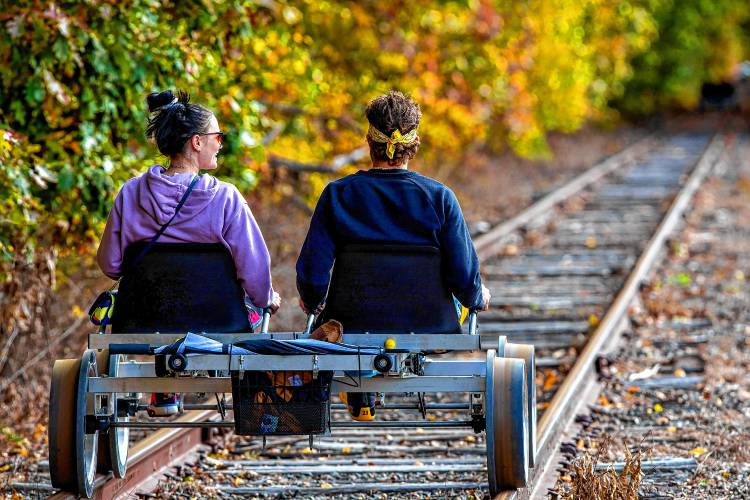The owners of Scenic RailRiders are asking the state to step in and buy six miles of rail in Concord that are slated to be sold as part of the Greenway Trail expansion, a move that would let them continue their business providing pedal-powered rail bikes.
“We have offered the State a very large, 6-figure-plus donation to put towards the purchase price of the corridor. In return, we want a 25-year lease with renewal option,” Carolyn and Gary LeBlanc wrote in an email to the Monitor. “We are currently trying to get an answer from the DOT Commissioner William Cass and Deputy Commissioner Michelle Winters. We are also trying to reach the governor, but have been unsuccessful so far.”
The New Hampshire Department of Transportation owns about 330 miles of abandoned rail corridors that were bought over the years as private rail companies stopped using them. The Bureau of Trails manages some for public recreation.
Conway Scenic Railroad and Granite State Railroad both have long-term leases for the use of state-owned rail lines.
After years of delays, the Concord city council voted in August to move forward with buying the rail corridor from CSX Transportation, the national rail firm that bought it in 2022 from Pan Am Railways.
The line, from Horseshoe Pond north to the Boscawen line, has not been used by trains in decades. This section could connect the Greenway Trail with the Northern Rail Trail to help create a statewide rail trail network.
As part of the contract, CSX has the option of removing the rails, which are made of steel and can be worth tens of thousands of dollars per mile in scrap value. The firm has a year to do any salvage.
The city council reached its decision despite the effect the sale could have on the Scenic Railriders business, which opened in 2019. The Greenway Trail plans to build on the elevated corridor and bridges used by the tracks, and officials said there isn’t room for a hiking trail to be built alongside the rails.
The LeBlancs disagree.
At the Cotton Valley Rail Trail in Wolfeboro, for example, people hike or bike on paved trails alongside and sometimes across rails, which are used occasionally by local fans to run small motorized rail cars.
But it is very unusual for rails to be left on corridors when they are turned into hiking trails, according to Eric Oberg, senior director of programs for the national Rails-to-Trails Conservancy.
“It sounds cool, but in 20 years of doing this, I can say it’s extremely rare,” Oberg told the Monitor in a September interview.
The LeBlancs said they haven’t given up hope in keeping their business, which they say has brought over 73,000 customers to Concord since it opened.
“Currently CSX and the city aren’t willing to try to keep us in place. Our only hope is for the state, whose job it is to care for railroads and promote their increased usage, to step in and save us,” the LeBlancs wrote.
What to Read Next
